| Botanical Name |
|
| Family |
Asteraceae - The daisy family. |
| Pronunciation |
sen-NEESH-shee-oh RAD-ee-kans |
| Common Name(s) |
|
| Plant Group |
- Ground Cover A plant with a low-growing, spreading habit, grown specifically to cover the ground.
- Succulent A plant having fleshy stems or leaves often adapted to dry conditions.
|
| Plant Size |
- Very Small
| Tree | 3m to 4m |
| Shrub | 25cm to 50cm |
| Perennial/ground cover | Up to 10cm |
| Bulb | 10cm to 20cm |
| Succulent | Up to 5cm |
|
| Position |
- Canopy Shade Canopy shade is found below closely grown trees where some light filters through. Ideal for the protection of herbaceous plants.
- Dry Shade Shady areas where soil has poor water retention or are dependent on rain for their moisture needs.
- Light or Dappled Shade Found below trees with sparse, open foliage. Ideal for the protection of herbaceous plants.
- Partial Shade The area is in shade for part of the day and in full sun for part of the day.
- Sun The area is in full sun for all or most of the day, all year round.
|
| General Information |
- Drought Tolerance: High The plant is well adapted to arid conditions; it can survive long periods of drought and high temperatures without extra water.
- Evergreen Plants that have leaves all year round.
- Frost: Half-hardy The plant is able to survive low temperatures and some frost but requires protection against severe frost.
- Roots Non-invasive Safe to plant near pools, paving, walls or buildings.
- Water Wise Plant species originating from low rainfall regions that require less water to survive and thrive than other plant species.
|
| Specific Information |
The small, pointed, succulent leaves of Senecio radicans grow singly along creeping stems that form a matted colony. The translucent 'windows' down the sides of the leaves allow sun to shine through, making this a most interesting subject for a hanging pot.
|
| Ad Break |
|
| Flowers |
| Description |
tiny flowers in clusters on paintbrush-like heads
|
| Season |
- Autumn to Winter Plants will seldom bloom for the entire season as given in the list, but should flower during a period within these parameters.
|
| Colour |
|
| Growth Rate |
- Very Fast Specifying growth rate can be very misleading as there is considerable variation of growth rate depending on type and species of plant, available water, supplementary feeding, mulching and general care, as well as the plants suitability and adaptability to the garden environment.
|
| Plant Uses |
- Container Trees, shrubs and ornamental species that can adapt to growing in a restricted environment.
- Ground Cover Low-lying plants that spread fast, require minimal maintenance, and cover large expanses or bare areas between bulbs or shrubs. They provide protection from erosion and drought and improve the visual appearance of the garden.
- Mass Planting Plants useful for filling a large area with just one or a few kinds of plants spaced close together. Creates a bold, dramatic effect and to reduces maintenance.
- Pot Plant A plant that needs a protected environment on a patio or indoors.
- Retaining Walls Shallow rooted plants for cascading over dry stone walls or planting in hollow spots in retaining blocks.
- Rock Garden An area constructed of larger rocks, arranged naturally, to emphasise the use of stones as a main element. Generally plants used do not need a lot of care.
- Stabilize Banks Plant is used to prevent soil erosion because their roots will form a mat that stabilizes the soil and keeps it from washing away in heavy rains.
- Suitable for coastal gardens Plants adapted to dry, sandy soil, forceful wind, limited rainfall and intense sunlight.
- Suitable for smaller gardens Such plants do not have invasive root systems, remain small or controllable and can often be grown in containers.
- Wild Garden An indigenous garden planted for the benefit of wildlife and birds. Provides food, water, a variety of mini-biomes and no poisonous chemicals are used.
|
| Distribution and Habitat |
Western Cape, Eastern Cape, Free State, in dry karoid veld, forming matted colonies under the shade of shrubs or rock ledges
|
| Planting Suggestions |
Plant Senecio radicans in light shade provided by shrubs or rock overhangs in well drained soil with a little compost if the soil is very poor. Keep just moist until established then water only when the soil is dry. I no longer mulch this Senecio as it is then unable to root into the soil as it travels. If used in retaining walls, they may need a little more water than they would normally get.
|
| Medicinal Uses |
|
| Ad Break |
|


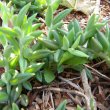
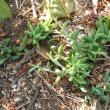
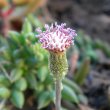
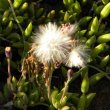
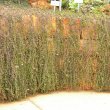
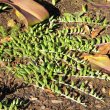


Discuss this plant
Share knowledge, ask a question or give an experience.